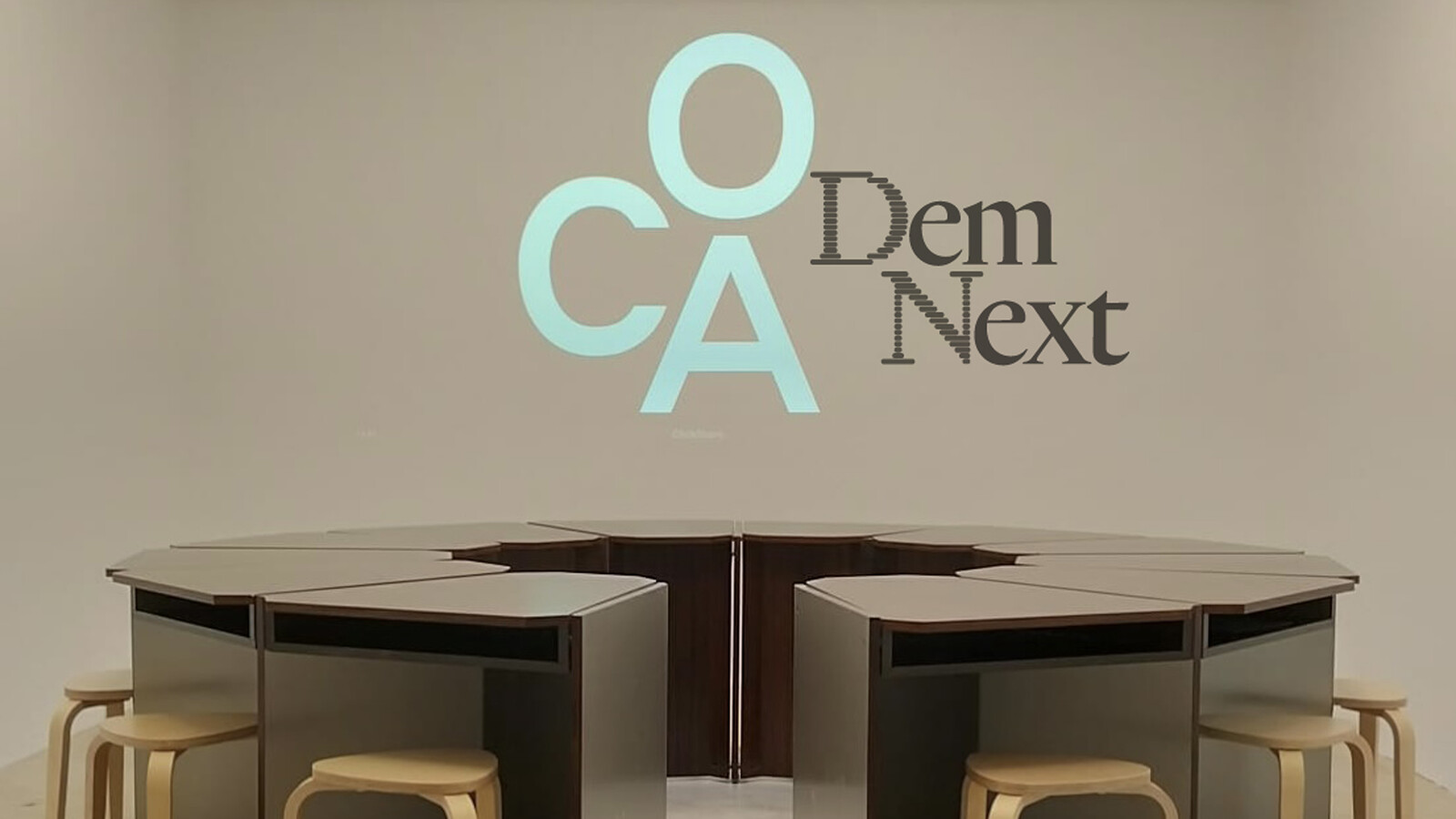Cultures of Assembly in collaboration with DemocracyNext and the City of Esch
July 1–3, 2024
The Esch Clinics launch a session with Christian Weis, Jean-Paul Espen, Claudia Chwalisz, James Macdonald-Nelson, Steve Faltz, Maria Spada, Do Demuth, Fatima Rougi, Markus Miessen, and César Reyes.
On July 1, after a year of preparations and negotiations by the Chair of the City of Esch, Cultures of Assembly (COA) started a strategic collaboration with The City of Esch and DemocracyNext, an international non-profit, non-partisan research and action lab on Citizens’ Assemblies, deliberation, and sortition—the practice of selecting decision makers by lottery.
In 2025, the City of Esch, in collaboration with COA and DemocracyNext, will implement one Citizens’ Assembly to address key and urgent questions about the future of the city—such initiative requires tapping into the collective intelligence of people living in the city to work together and find common ground on recommendations. The intention is to learn from this first experience to institutionalise Citizens’ Assemblies and make them a part of Esch’s expanded democratic structure.
This two-year-long collaboration between Cultures of Assembly and DemocracyNext will run in parallel and in close proximity to the forthcoming research project The Esch Clinics (September 2024 until December 2027), devised and conducted by the Chair of the City of Esch (project lead: Principal Investigator (PI) Prof. Dr. Markus Miessen with Dr. César Reyes Nájera). The collaboration will focus on the implementation of a series of citizen assemblies in Esch-sur-Alzette that will produce a local base narrative and complement the activities and initiatives of The Esch Clinics to investigate questions around urban commons and innovating democratic urban governance.
Background
In 2023, DemocracyNext convened an International Task Force on Democratising City Planning—a group of globally renowned professionals from various spatial practices and the field of deliberative democracy to reimagine how urban planning decision-making processes could place more power in the hands of people.
The Task Force resulted in a paper with six proposals for systemic change to city planning decision making—with Citizens’ Assemblies playing a key role. Citizens, broadly representative of a community’s diversity, are at the heart of these proposals, in constructive relationship with city government, planners, designers, developers, community groups, and nature.
To bring these ideas to life, DemocracyNext is convening an international cohort of cities from July 2024 to December 2025 who are eager to make these systemic shifts. In early 2024, DemocracyNext held an application process for cities to express their interest in partnering to pilot the six proposals. They received over 20 applications from cities in 17 countries around the world, including Esch.
After several conversations with Mayor Christian Weis, Secretary General Jean- Paul Espen, Claudia Chwalisz of DemocracyNext, and the Chair of the City of Esch, Markus Miessen, we are happy to announce this collaboration between DemocracyNext and Esch-sur-Alzette.
What does the collaboration entail?
–DemocracyNext will build capacity through a 3-stage learning program to increase the knowledge and capacity of staff and decision makers to initiate and run a Citizens’ Assembly.
–They will provide ongoing advice and guidance throughout implementation of the Citizens’ Assembly by local partners.
–They will provide opportunities for knowledge-sharing and learning between a cohort of cities.
–It will be carried out shared research with The Esch Clinics to evaluate and learn from the process of designing and implementing the Citizens’ Assembly for future iterations and institutionalisation.
–It will be promoted the collaboration in order to inspire other cities globally.
References
MacDonald-Nelson, James, Claudia Chwalisz, Ieva Cesnulaityte, and Lucy Reid. Six ways to democratise city planning: Enabling thriving and healthy cities. DemocracyNext, 2024.
DemocracyNext (2024). Executive Summary Six ways to democratise city planning: Enabling thriving and healthy cities.
Miessen, Markus (ed.). Agonistic Assemblies. On the Spatial Politics of Horizontality. Sternberg Press, 2024.
Participants
Christian Weis, Mayor of the City of Esch-sur-Alzette. He is a member of the CSV (Christian Social People’s Party), has served the communal council since 2016, and joined the College of Mayors and Aldermen in 2020.
Jean-Paul Espen, Secretary General of the City of Esch-sur-Alzette. He joined the City of Esch in 2010 as legal counsel, before being nominated in 2014 as its Secretary General.
Claudia Chwalisz is the Founder and CEO of Democracy Next and an Obama Leader Europe 2023. Prior to that, Claudia served as the Innovative Citizen Participation Lead at the OECD.
James Macdonald-Nelson is the Cities Programme Lead at DemocracyNext. He is a designer with degrees in landscape architecture, urbanism, and global development studies.
Steve Faltz is the president of the municipal section of the LSAP (Socialist Party) and was placed as their top candidate in the past elections in Esch-sur-Alzette in June 2023.
Maria Spada is an architect, urban planner, and Head of Industrial Heritage at CNCI (National Center of Industrial Culture).
Do Demuth is an architect and co-secretary of FerroForum, a non-profit organisation committed to the transmission of the industrial heritage that has shaped the Grand Duchy for over 150 years.
Fatima Rougi is a feminist, writer and journalist, and currently the head of press relations at Kulturfabrik, a key cultural center in Esch-sur-Alzette.
Markus Miessen is an architect, consultant, writer, and Professor of Urban Regeneration at the University of Luxembourg, where he holds the Chair of the City of Esch.
César Reyes Nájera is an architect, co-founder of dpr-barcelona.com, and postdoctoral researcher on Urban Regeneration at the University of Luxembourg.
Cultures of Assembly—Chair of the City of Esch
Prof. Dr. Markus Miessen, Professor or Urban Regeneration
Department of Geography and Spatial Planning
Faculty of Humanities, Social and Educational Sciences (FHSE)
University of Luxembourg






